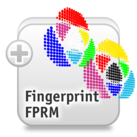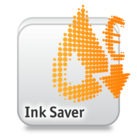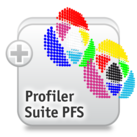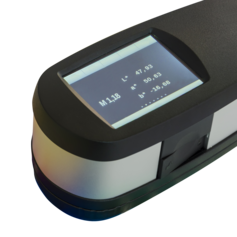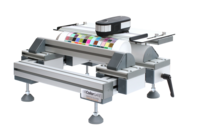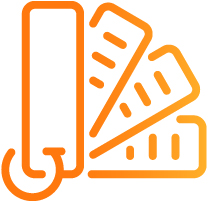
GESTIONAR LOS COLORES DE LA MARCA
CONSISTENCIA DEL COLOR Y GRÁFICOS DE ALTA CALIDAD
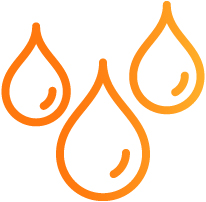
TECNOLOGÍA INK SAVER
MENOS TINTA - SIN PÉRDIDAS VISUALES DE CALIDAD
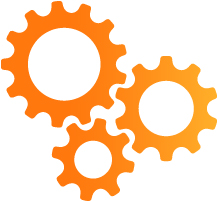
AUTOMATIZACIÓN DE PROCESOS
EVITE ERRORES Y AHORRE DINERO
Ahorre tiempo, dinero y mantenga la uniformidad del color
Conseguir resultados de alta calidad en la impresión de envases es un reto para cualquier empresa que quiera destacar en el competitivo mercado actual. No es fácil captar la atención del consumidor a la vez que se transmite el valor del producto.
Para lograr estos objetivos, es esencial apoyarse en herramientas eficaces que puedan agilizar el proceso de producción y, al mismo tiempo, garantizar resultados uniformes.
ColorGATE Packaging Productionserver ofrece muchas ventajas que llevarán su producción de envases a un nuevo nivel, como nuestro Fingerprint Module que mejora su flujo de trabajo de impresión al permitir definiciones de color exactas, archivar datos de producción de impresión e imprimir reproducciones exactas en cualquier momento.
Nuestro software es ideal para conseguir resultados fiables en diferentes prensas y en distintas condiciones de impresión, al tiempo que se reducen los costes de material y mano de obra.
Obtenga más información de nuestros expertos y destaque en el mercado actual:
Áreas de aplicación
- Directo al objeto
- Botellas y vasos
- Latas, botes, tubos
- Envases
- Envases flexibles
- Etiquetas y fundas
- Cartón plegable
- Cartón ondulado
QUÉ OFRECEMOS
GESTIONAR LOS COLORES DE LA MARCA
Con nuestras herramientas de gestión del color, garantizamos una reproducción del color precisa y coherente, independientemente del material: papel, etiquetas, cartón ondulado o directamente sobre el objeto. Además, también admitimos colores directos utilizando el Spectral Spot Module, siempre que disponga de una cuenta PantoneLIVE.


TECNOLOGÍA DE INK SAVER
Con nuestra tecnología de Ink Saver, puede reducir el consumo de tinta y conseguir hasta un 30% de ahorro en costes de tinta. Esta innovadora tecnología no sólo mantiene visualmente los mismos estándares de alta calidad para sus impresiones, sino que también reduce el tiempo de secado.
AUTOMATIZACIÓN DE PROCESOS
Nuestras avanzadas soluciones de automatización no sólo hacen que su cadena de producción sea menos susceptible a errores, sino que también le ahorran tiempo y dinero, permitiéndole superar cualquier reto de gestión del color que se le presente.

Detalles Técnicos
Funciones Básicas
Media-Ink-Metamode (MIM)
- ColorGATE development to create production-influencing parameters such as medium (M), ink (I) and metamode (M); every MIM combination links profile, linearization and print mode settings into a single logical unit
- MIM administration: import, export, administration and processing of MIM combinations
ICC color management with CrossXColor Technology
- Use of rendering intents (options: Photographic; Perceptual; Absolute perceptual; Relative colorimetric; Absolute colorimetric; Saturation; Absolute compression; Blackpoint compensation; Lightener compensation; Minimal white compensation)
- Use of embedded ICC profiles in JPEG, TIFF, PDF, PSB and PSD files for use as input color space; embedded Output Intents can be used
- Multicolor ICC Engine: Support of multicolor ICC profiles with up to 15 color channels
- ColorGATE GamutPlus: Enhanced CMYK input color space, based on ISOcoated_V2 for a more color intensive output
16-Bit Color Rendering
For a higher color accuracy and smooth gradientsPreservation of pure colors
Preservation of black, CMYK or single CMYK channels as pure colorsVarious options for color correction
- Correction of brightness, contrast and gamma
- Gradation curves
- Separate or simultaneous channel processing possible
Saturation enhancement
To increase the saturation of output colorsGamut Viewer
Two- and three-dimensional (2D/3D) visualisation and comparison of color spacesSpecial color printing (white/varnish/metallic; printer-dependent)
- Support of white, varnish and metallic printing (on appropriate printing systems)
- Output variants: pixel, filling, selective, flood, spot color, including preview, and others
- Combination of process colors, silver metallic ink and white ink
- Layering technology
- Separate gradation curves possible
- Spread and Choke: overlap/border filling adjustable for special colors
- Intensity: adjustable intensity/density of the white or special color channel
- Preview for white print
Preview (full screen, split, thumbnail, softproof)
- Document view, placement on output media, rotated view, full screen preview, preview with special colors
- Split: before and after display for visualization of changes
- Thumbnail: job thumbnails, display of job properties
- Softproof: simulation of the print output on screen, merging of separated PDF files
Loading of media size (printer-dependent)
- Available for e.g. HP-DesignJet-Z series, Roland AJ, FP, VP, XC, XJ and various Epson Stylus Pro printers
- Automatic or manual
Confidence strip
- Printing of a confidence strip with the color channels used to ensure a consistent printout
- Different positions and sizes possible
Various scaling options
- Proportional/non-proportional scaling in height, width, percent
- Automatic scaling to media size
- Visual scaling: proportional scaling by means of a distance tool
Copy and layout print
- Job repetetion, multiple output with only one RIP process, last row filling (better media utilization)
- Device handled creation of multi-copies, in which the parameters are transferred from the RIP to the device controller (printer-dependent)
Cropping
Definition of print areasRotate and mirror
- Rotate in 90° steps
- Jobs can be rotated space-optimized, even automatically
Offset and centering
- Horizontal/vertical offset adjustment
- Centering on sheets and rolls
Auto tiling
Automatic segmenting for printing oversized jobs with optional overlapCut marks and registration marks
- Printing of cut and registration marks
- Style: inner/outer marks, inner/outer frames, japanese marks; different line widths, styles and colors; can be placed on PDF TrimBox via function
- Dimensions: symmetrical/asymmetrical adjustment of distance and length
FOTOBA and FLEXA cut marks
- Printing of special cut marks for FOTOBA or FLEXA cutting systems (for the output of containers, the TNM is required)
- Separate adjustment of distances and lengths
Overlap/Tiling marks
- Horizontal/vertical distance and width/height adjustable
- Optional marks or solid lines
Eyelet marks
- Eyelet style, offset, distance, number, color, diameter and thickness adjustable
- Optional crosshair printing
Printing of job information
- Free to formulate
- Contain e.g. EXIF data, input profils or the print date
- Freely defineable formatting settings, e.g. position, font type, size and color
Anti Aliasing (printer-dependent)
Enhanced print quality for certain printers with low resolutionInterpolation for raster files
- Various setting options for interpolating raster files such as TIFF, JPEG, etc.
- Options: Nearest neighbour, Bilinear, Bicubic, Bicubic sharp
Replacement of missing fonts
Detection of missing fonts and optional replacement with CourierMedia compensation
Compensation of length and width deviations in the output formatSelection of various screens
- FM - frequency modulated (Speed Screen, Frequency Screen, ColorGATE Crispy, ColorGATE Smooth, Floyd-Steinberg, Error Diffusion, Error Diffusion Smooth)
- AM - amplitude modulated (Custom Screen, Super Rosette 2)
- Hybrid - combination of AM and FM screening (Hybrid Screen 2)
JobInfoLog (monitoring of job processing)
Monitoring/logging of job processing, display of job- and event-related information, of print time, print speed and print area, warning e.g. of missing fontsRIP and print simultaneously/automatically
- Printing the job while RIP process is running
- RIP/print automatically executable
Various options for job processing
- Reproduction of already printed jobs without a new RIP process
- Processed print jobs are optionally deleted automatically (different options possible)
- Automatic pause after each print job / manual confirmation of the release for each print job
Flexible management of job queues
- Importing/Positioning jobs using Drag&Drop
- Simultaneous moving of multiple jobs within the job, RIP and printer queue
- Job sorting according to numerous criteria possible, free definition of column type/number, automatic placement of new jobs to the correct position within the queue
Quick assignment of hotfolder settings
- Transfer of hotfolder settings to individual jobs via mouse click
- Possible for individual tabs as well as for all settings
Job duplication
- Duplicating jobs
- Creating links to other jobs
Sending jobs to other open printers
Transfer of an existing job including appropriate settings to another printer definitionSupport of virtual printers
- For transferring print jobs out of an application
- Including export of configuration specific PPD's (PostScript Printer Definitions) under PC/Mac/Unix
Backup/Restore of RIP configuration
Backup and restore of the current RIP configuration including program settings, printer definitions, jobs, profiles, etc.Cutting function support for hybrid devices (only with PCM, printer-dependent)
Support of print and cut workflows for printing systems with an integrated cutting functionDisplay of color information (Color Picker)
- CMYK percentage values displayed in full screen preview
- Measured color can be replaced
Printer Status Monitor (printer-dependent)
- Display of e.g. ink level, media length, warnings/error messages
- Available for e.g. HP Z series, Roland AJ, FP, VP, XC, XJ and various Epson Stylus Pro or Canon printers
System languages
- Chinese (simplified), English, French, German, Greek, Italian, Japanese, Russian, Spanish
- For following languages a basic localization is available: Chinese (traditional), Finnish, Korean, Norwegian, Polish, Portuguese
Formatos de archivo
Support of raster file formats
- BMP, JPEG, TIFF, PNG, PSB, PSD
Support of PDF, PS, EPS
- Adobe PDF 1.7, PDF/X-1a, PDF/X-3, PDF/X-4, PDF/X-5 and PDF/VT
- Postscript 3, EPS, DCS 2.0
- Single-page/multi-page and separated possible
Requisitos del sistema
Sistemas operativos (64-Bit):
Requisitos mínimos de hardware:
Recomendado para utilizar una impresora:
Recomendado para utilizar varias impresoras:
Instalación y funcionamiento:
Se requiere un puerto USB para el dongle de hardware; adaptador LAN, TCP/IP para el acceso a la red; las licencias basadas en software requieren acceso a Internet (el software debe conectarse al servidor de licencias aproximadamente una vez al día)Interfaces compatibles (en función de las impresoras, dispositivos de medición y plotters de corte utilizados):
Ethernet, TCP/IP, USB, FireWireUso en entornos virtualizados:
Licencias basadas en software:
El funcionamiento del software ColorGATE en máquinas virtuales no está permitido con licencias basadas en software.
Licencias basadas en hardware ("hardware dongle"):
Si la solución de virtualización admite USB, el software ColorGATE puede funcionar normalmente con licencias basadas en hardware. Tenga en cuenta, sin embargo, que ColorGATE no puede proporcionar soporte para problemas que se produzcan en el contexto de la solución de virtualización. Puede haber restricciones cuando se conectan impresoras, dispositivos de medición o plotters de corte a través de USB. Además, los requisitos de hardware deben estar disponibles exclusivamente como recursos para la máquina virtual a fin de garantizar un funcionamiento de alto rendimiento del software. Por estos motivos, recomendamos utilizar los entornos virtualizados únicamente con fines de prueba.




